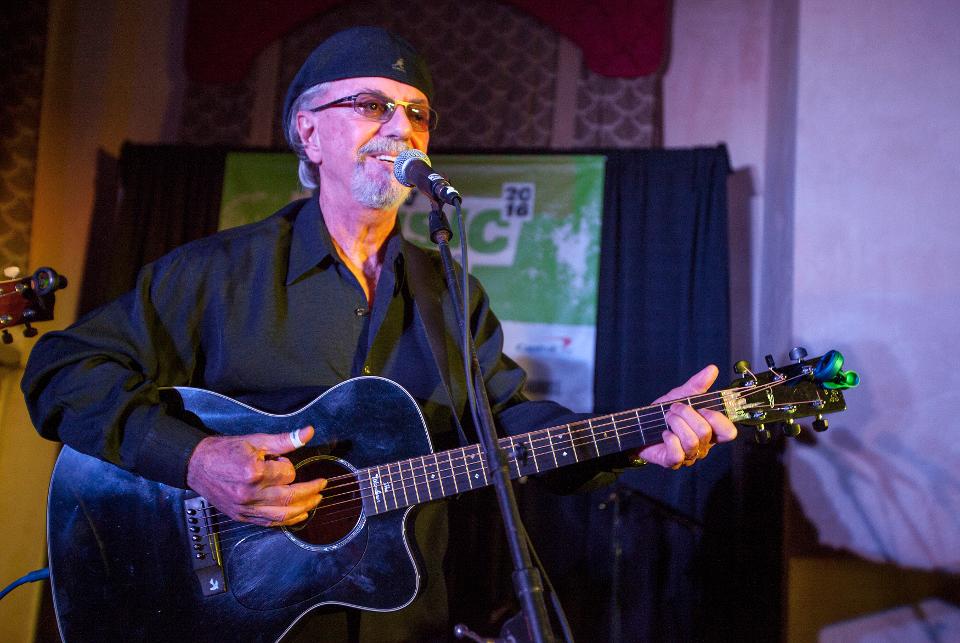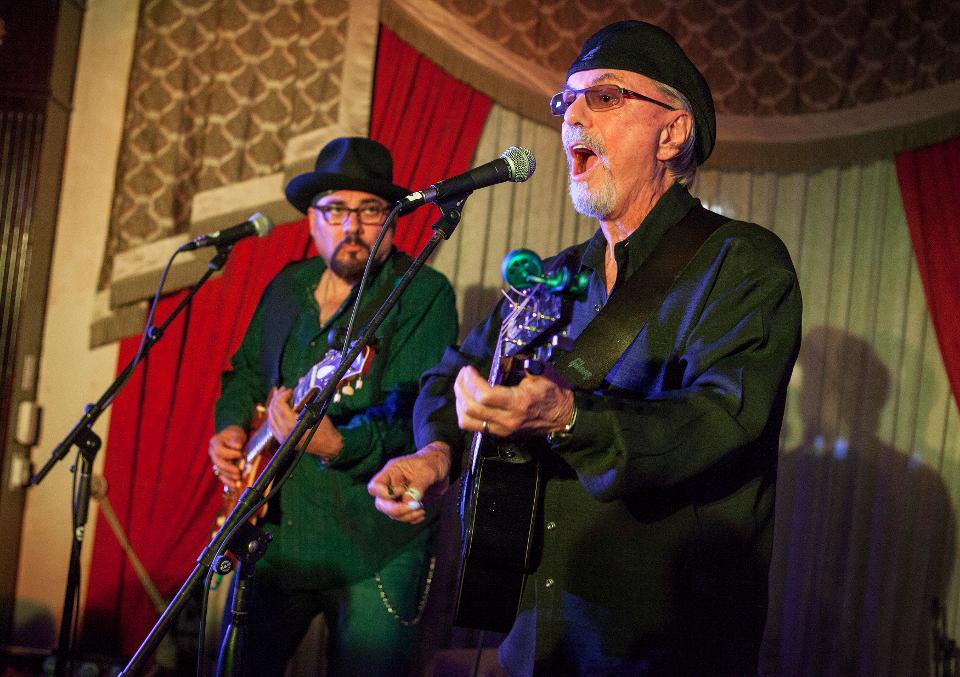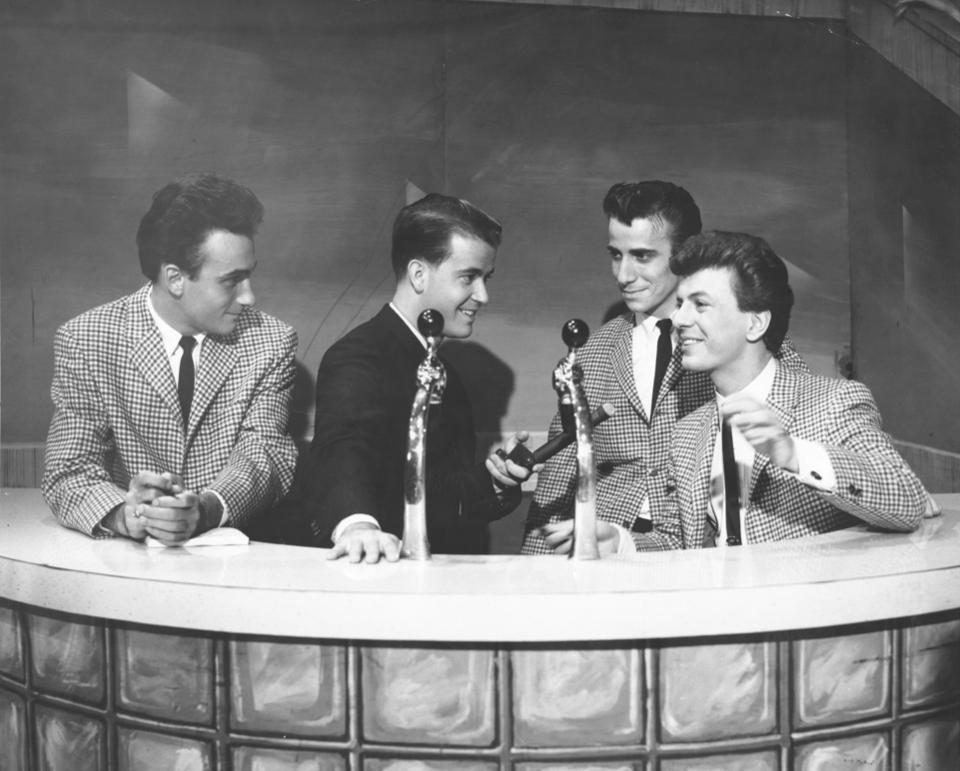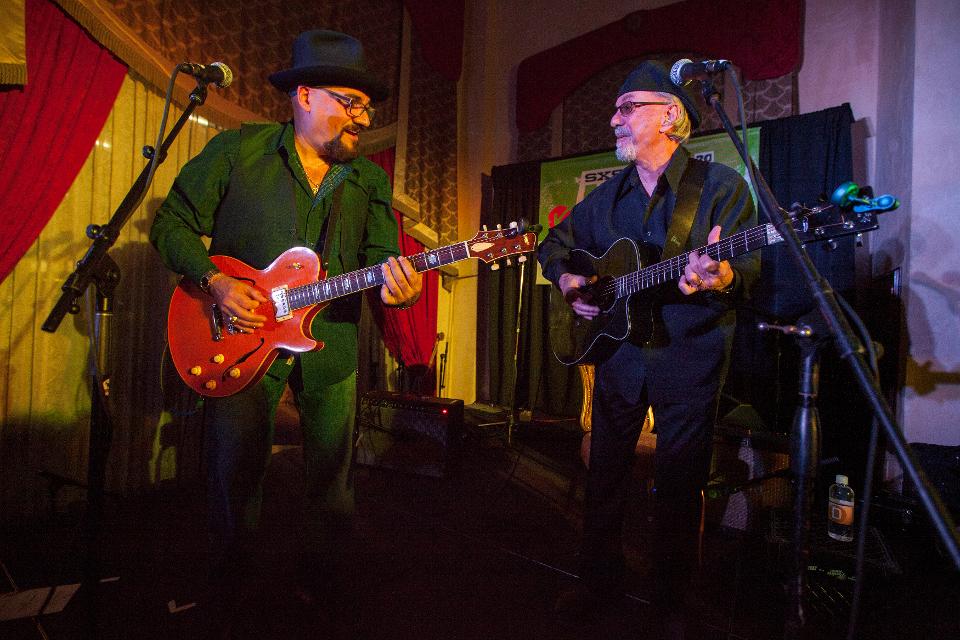
Dion Francis DiMucci performs as Dion at the Victorian Room at the Driskill Hotel, during the South … [+] by Southwest Music Festival on Thursday, March 17, 2016, in Austin, Texas. (Photo by Barry Brecheisen/Invision/AP)
Barry Brecheisen/Invision/AP
Bronx, New York-born singer Dion DiMucci soared to national stardom with vocal group Dion and The Belmonts, scoring groundbreaking hits like “I Wonder Why” and “A Teenager in Love” between 1957 and 1960.
Present at the onset of rock and roll, the group toured nationally in 1959 as part of the ill-fated Winter Dance Party, placement which put them front and center on the day the music died, when a small plane crash infamously killed rockers Buddy Holly, Ritchie Valens and The Big Bopper near Clear Lake, Iowa on February 3.
Dion would go on to experience some of his greatest success as a solo artist, tallying legendary hits like “Runaround Sue” and “The Wanderer,” en route to enshrinement in the Rock and Roll Hall of Fame in 1989.
In 1962, he made his way to Columbia Records, where he was exposed by famed talent scout, producer and NAACP board member John Hammond to authentic blues music.
Much to the chagrin of the label, Dion sought to make the blues his own and it would take until 1968 before he’d climb the charts again, following the success of “Abraham, Martin and John.”
For Dion, 80, his latest album Blues With Friends is just that, a terrific set of fourteen scorching songs each featuring famous acquaintances like ZZ Top’s Billy Gibbons, Jeff Beck, Paul Simon, Van Morrison, Little Steven Van Zandt, Bruce Springsteen and Patti Scialfa in addition to a special liner note contribution by Bob Dylan. But nobody looms larger over the new record than incendiary contemporary blues guitarist Joe Bonamassa.
“I think that it’s fair to say that Joe was the key or the catalyst for the vision,” said Dion over the phone of Blues With Friends. “It just happened that he wanted to play on something and it sparked such an interest in me to maybe cast certain guitar players on certain songs.”
“What astounds me today about Dion is the fact that he still sings in the original key. And he’s one of the last of the founding fathers of rock and roll. Other than Jerry Lee Lewis, he’s the last man standing. So it’s amazing,” Bonamassa told Forbes. “His influences in the blues, being in New York, he was singing pop on one side of the street and listening to blues and R&B on the other side. It was a neighborhood thing. And I understand that. Because I grew up upstate and there was a little bit of that element,” said the guitarist. “What a story. On one hand, he literally wrote the book – he was part of writing the book of rock and roll – then rebelled against that in the mid-60s. He didn’t want to be a superstar anymore – he wanted to be a blues singer. The fact that such a wide variety of artists showed up for the new album, of all different facets of rock and roll and blues all in tribute to one guy, is a testament. ”
I spoke with Dion DiMucci about the early influence of country blues on the radio, the array of artists that help fuel Blues With Friends, the importance of great storytelling and much more. A transcript of our conversation, edited for length, follows below…
You write in the liner notes that your earliest influences were country blues. Where were you hearing that early on, was it on the radio at a vastly different time for that medium?
Dion DiMucci: Oh yeah. I discovered a channel [WAAT AM]. I lived in the Bronx and there was a guy named Don Larkin. He had a country show coming out of Newark, New Jersey. I talked to him later on in life when he was living in Arizona. But he had fallen in love with country music in the Army. And he became a disc jockey.
I used to run home from junior high school just to catch maybe the last 30 minutes of his show. Then I found out that my landlady had a tape recorder so I borrowed that and started recording what I heard of those last 30 minutes of his show.
I learned a lot of Hank Williams songs and Lefty Frizzell. I even caught a Jimmy Reed song one time. Well my god that did it.
So, it’s that kind of stuff that’s in my DNA, always was – from the very beginning.

On right, Dion Francis DiMucci performs as Dion at the Victorian Room at the Driskill Hotel, during … [+] the South by Southwest Music Festival on Thursday, March 17, 2016, in Austin, Texas. (Photo by Barry Brecheisen/Invision/AP)
Barry Brecheisen/Invision/AP
As you started to move past country blues, what else were you beginning to discover early on? Because I’m really fascinated by that period before there was rock and roll…
Dion: Well, that’s what happened to me in the early 60s when I went to Columbia Records. I started out listening to maybe Jimmy Reed. I think I heard maybe John Lee Hooker or Lloyd Price. Some of the rock and roll blues stuff. Little Richard. Even Fats Domino. I started to hear that.
In the early 60s, John Hammond Sr. played me Robert Johnson “Preachin’ Blues” from King of the Delta Blues Singers. And he was smiling ear to ear that it sold 25,000 records by word of mouth. He played me some Fred McDowell, Leroy Carr, Lightnin’ Hopkins. Well, I went out of my mind. Because I felt like I hit the jackpot here. I just grabbed a handful of albums went home and couldn’t come out.
It was like the first time I heard Hank Williams – when I was 11. It was like I got my second breath. And I just was enthralled with that stuff.
And the British Invasion – well, I call it “the British Infusion.” Because they were listening to everything that was hiding in plain sight in America. And they kind of threw it back to us. They were listening to it – this stuff that I was discovering over at Columbia.
Once you hear these guys that weren’t into hit records… I mean, I guess they wanted to be good – but it was so genuine. And the lyrics are just genius. The stuff they write is… I’m still trying to write stuff like that!
When I think of the blues, one thing that’s universal from Robert Johnson to Gary Clark Jr. is that the ability to tell a story. How important was the simple idea of storytelling to a blues album like this?
Dion: Sometimes the blues can really be guitar driven. And there’s not enough concentration on stories or the memorable stories. There’s some great blues stories – “The Thrill is Gone” or “Born Under a Bad Sign.” To write a song like that – that’s kind of the gold standard.
I was trying to write some memorable songs and say some things in a different way. Because, to me, great art is like something very familiar – but distinctive. Where you say, “Wow! I just never saw it that way.” So that’s what I was trying to do.
But, as far as my songwriting, if I could inhabit the character who’s telling the story, I could find out what kind of actions or what he’s thinking. Sometimes it’s stuff that I thought of when I was 16. So you throw it in there. But the more that I could define the character, the more verses I write.

NEW YORK – 1959: (L-R) Carlo Mastroangelo, Dick Clark, Fred Milano and Dion DiMucci of the doo-wop … [+] group “Dion and the Belmonts” get interviewed on Dick Clark’s show in 1959 in New York, New York. (Photo by Michael Ochs Archives/Getty Images)
Getty
You’ve written songs and you’ve written a book. What’s the key to telling a compelling story in three minutes as opposed to say 300 pages?
Dion: Well, to me, it’s so much easier. I come from a very contentious household. My parents always argued. And I kind of discovered early on that, within a three minute song, I could resolve conflict. I could define it and resolve it and go, “I feel much better now!”
Of “I Got the Cure,” which features Sonny Landreth, you write in the liner notes that the blues doesn’t always have to be about the down and out. When I listen to the blues – especially when I see it performed live – that music is a celebration. It can be uplifting. How important is that sometimes overlooked element of blues music?
Dion: I think there’s a lot of that. B.B. King said it feels so good to sing about something so bad. I kind of defined it as the naked cry of the human heart longing to be in union with god. People crying out in the psalms and the bible? Those are blues songs. But sometimes it can be very uplifting.
With “I Got the Cure” – it’s a funny thing you mention that one – I grew up across the street from George’s Bar and Grill. And you had these wiseguy gangsters, or wanna be gangsters, on the corner. And that’s what “The Wanderer” came out of. It was worth telling a story about this guy who had all of the tattoos on him back then. He was before his time.
But, periodically, that theme reemerges. And I wrote a song called “King of the New York Streets.” I wrote a song called “Gangster of Love,” which came out on an album called New York is my Home in 2016. And now, on this album, it’s “I Got the Cure.”
It’s the same kind of guy but a different perspective. That kind of bragging thing, you know?
It looks like Joe Bonamassa was a big influence on this project. He plays on “Blues Comin’ On” and you single him out several times in the liner notes. How important was he to this album in the early stages?
Dion: I’d say he was the key to the whole vision of the album. Because, believe me, I couldn’t plan it if I tried.
I didn’t plan this. I had 14 songs. I had some downtime. I went in and I knocked them out in three days. I played them for Joe and he wanted to play on one of them. So I said, “Be my guest.” That was a big gift.
I realized, just listening to the thing, how limited I am in my concept of what I would want from myself on these songs. I’m creative as all get out. I could write the songs. I could sing them great – I know I feel like I’m inside the songs. But I’m very limited in what I hear on them. What he gave me was something I couldn’t imagine, think of, dream of or even ask for.
The next one I thought, “I’m going to play this with Billy Gibbons…” And he loved it. He loved “Bam Bang Boom.” So he jumped on it.
Then I had one ballad that I was thinking about and I thought of Jeff Beck. Because he’s the only guitar player who can make me cry. He has beautiful tones and a way of playing. All of these guitar players are very different from one another. So it just started to pick up steam. And I went with it.
“I Got the Cure?” I knew that Sonny Landreth could knock that out with one hand tied behind his back. And I knew Stevie Van Zandt belonged on “Way Down” with his grunge thing. I knew Brian Setzer had that whammy, hot rod guitar and he would knock it out of the park. And they’re all so different. Samantha Fish? Forget about it.
So that’s why I have kind of all of the decades represented.
“Song for Sam Cooke (Here in America)” speaks to 1962 at times as much as it does 2020, unfortunately. How important was it to tell that story today?
Dion: It’s weird. Because I wrote that song a long time ago. The song just sat in the back of my drawer for years. I forgot about it. I remember writing it and thinking, “Well, it’s too long. There’s too much of a story. It’s too personal. Let’s move on.”
Then last year I see [the Oscar winner for Best Picture] Green Book. And I thought, “Man… they made a movie about my song.” So I go back in the drawer, pull it out and dust it off.
The song – it’s a little different than Green Book. I think that really stirred me, because I love the movie. But the song is not necessarily about racism in America: it’s more about brotherhood and understanding and compassion – [Sam’s] understanding of me.
He was a very refined guy. He grew up and his father was a pastor. He grew up very different. I feel like, now that I look back on it, that I could define it a little better. Because I feel like he was living out the gospel – loving your brother and understanding me – in spite of what was going on around us. Because he brought me to see James Brown when nobody knew him. And people were getting on my case. And he would say, “Hey, brothers, he’s with me…” He protected me. It was the opposite of Green Book.
So, I’m really happy with it. Because Paul Simon and I kind of bonded on it. We both had a relationship in a way with Sam Cooke. So he knew exactly what I was trying to get across.

On right, Dion Francis DiMucci performs as Dion at the Victorian Room at the Driskill Hotel, during … [+] the South by Southwest Music Festival on Thursday, March 17, 2016, in Austin, Texas. (Photo by Barry Brecheisen/Invision/AP)
Barry Brecheisen/Invision/AP
You told Forbes last year that Buddy Holly once told you, “I don’t know how to succeed but I know how to fail. Try to please everyone and you’ll go nowhere.” To that end, how important has it been to you all of these years to continually push the music forward and try new things. Because unlike some of your peers, you have not settled wholly for nostalgia…
Dion: Yeah, I think I still live by that. I still believe it. In fact, I had more than an hour of conversation with Paul Simon last night. And this is exactly what we were talking about in a lot of ways. Because when nobody was watching, and he let go of everything, he made Graceland. And I made “Abraham, Martin and John.”
He’s supposed to be retired… Well, he’s involved in, I think, one of the most creative times of his life right now. He’s telling me how his creative juices are flowing. He’s having such a good time with it. He’s enjoying it.
And we were both talking about the idea of sometimes letting go – just letting the past go. And once you let it go, all of the sudden, you find yourself with new energy and a new vision. You feel relevant. You’re not thinking about who to please and what you did. You just let it go. And you find yourself in the present.
And there’s nothing like being in the present. Because you step under the spout where the glory comes out – that wellspring of creativity, you know?
I wouldn’t have done this album if I didn’t feel relevant. Who cares? If I didn’t feel relevant and creative, I would have no reason to do this. But it just comes.